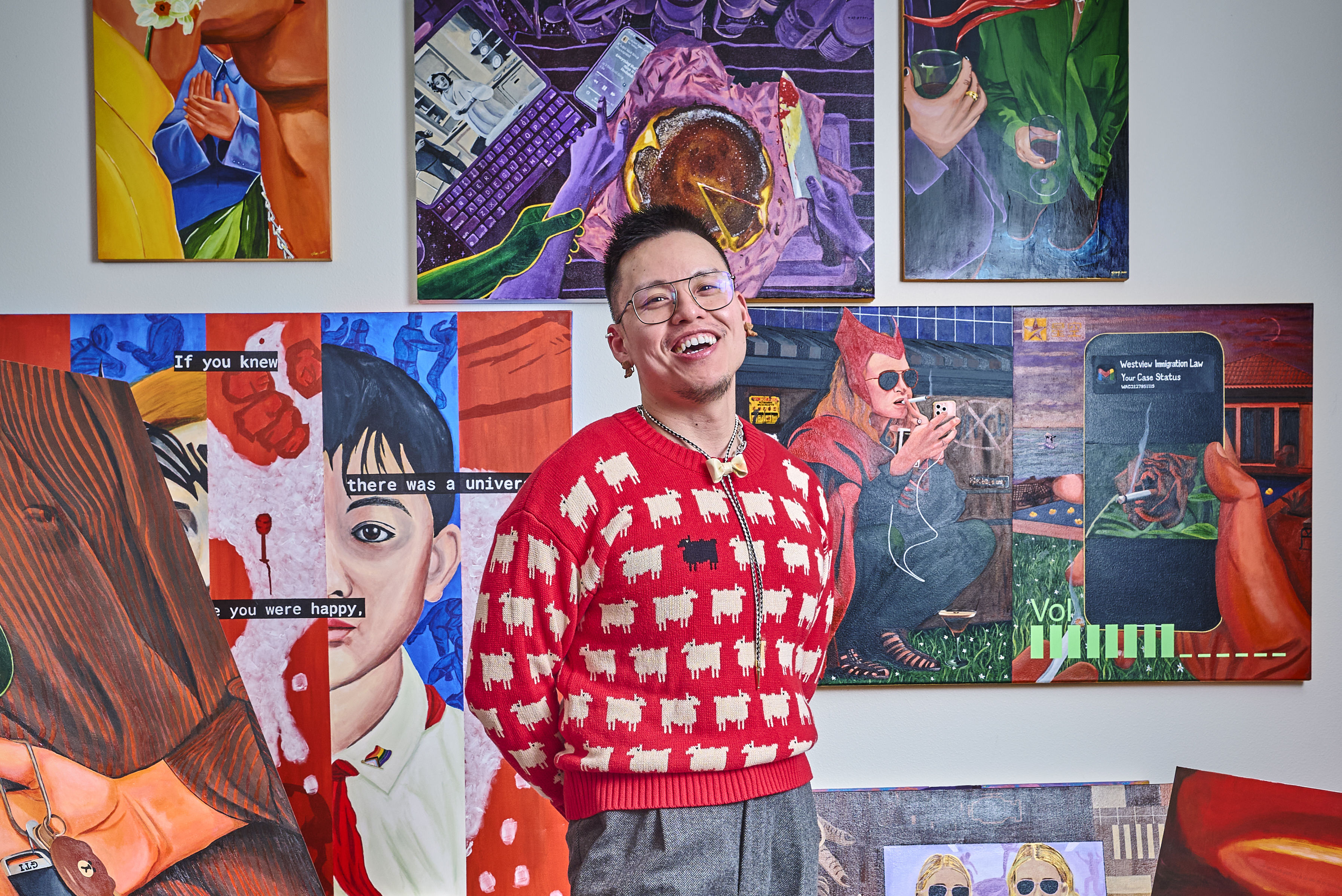
Reasons to Love Portland
What do you love about Portland? Capture it artfully on your phone and post a photo to Instagram or Twitter. Tag us at @pomomagazine, use the #lovingpdx hashtag, and we’ll print our favorite shots in the July issue!
Microparks. Microbrews. Big air. Big hearts. Double lives, world records, and ancient roses. We offer a bouquet of our city’s countless charms.

Image: Nomad
Because the sun will always rise over Mill Ends Park.
That’s right, the world’s smallest park is still ours. Dedicated on St. Patrick’s Day 1948 as “the only leprechaun colony west of Ireland,” our tiny, 452-square-inch urban patch at SW Naito Parkway and Taylor Street appeared when a site intended to house a light pole began to sprout weeds. A pathetic recent British attempt to claim the title for a much bigger park only reminds us that in our beloved city, every shortcoming holds a new opportunity.
Because our female athletes kick ass.
1: Worldwide rank of Nadine Angerer, the new German goalkeeper who joins North American superstars Christine Sinclair and Alex Morgan on the Portland Thorns roster this season
60: Percentage of female contestants at last year’s Oregon Ironman (!) Bodybuilding competition
115: Weight, in pounds, of Portland’s MMA fighter Glena “Heartless” Avila, the first women’s champion in local full-contact fighting history
7: Years the Oregon Rugby Sports Union women’s team has ranked in the nation’s top 10 (as of press time, ORSU ranks no. 3 in the country)
4: Games the Portland Shockwave, our full-contact women’s football team, plays this month in Hillsboro Stadium (they won the PNW championship in 2011)
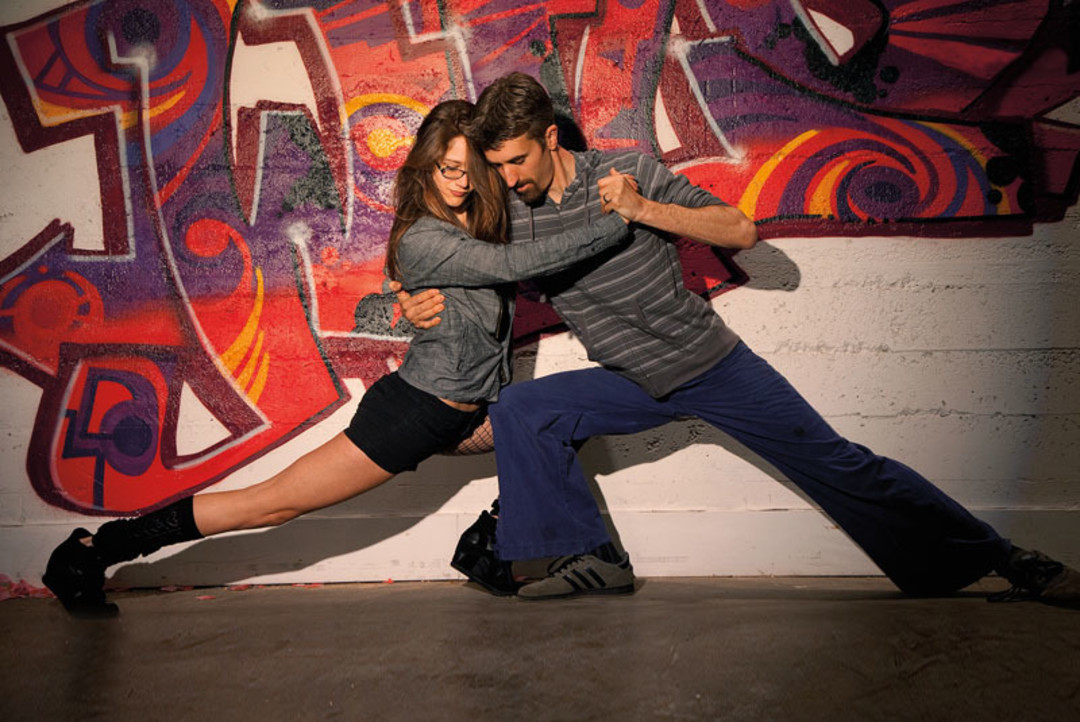
Image: Courtesy Julian Wilde
Because we are the secret tango-dancing capital of the hemisphere.
The sexy dance may be rooted in Argentina, but Portland is one of few places north of Buenos Aires with classes, practicas, and milongas every night of the week, all to serve about 300 dedicated local dancers. Plus, the nation’s largest tango event, February’s Valentango, draws hundreds of dancers from around the world.
Because even our major literary series totally kills it.
This year, Literary Arts’ Portland Arts & Lectures series tallied 2,337 subscribers. Indeed, our booklovers would fill two-and-a-half theaters at the country’s most pretigious lecture series, New York City’s legendary 92nd Street Y. Popularity fuels marquee-name ambition: the series attracts the likes of Ann Patchett, Sonia Sotomayor, and Salman Rushdie.
Because we've got the biggest Little Writing Scene in the World
Manhattan’s literary sphere provokes awe and anxiety: imagine a cocktail party full of sharp-elbowed Columbia grads. Portland’s more accessible scene is yet another reason to celebrate our town. And we’re on a strong upswing, word-wise: Powell’s City of Books is receiving a major face-lift, Reading Frenzy just reopened in a beautiful space on N Mississippi Avenue, and in 2015 Wordstock will escape the convention center’s fluorescent glare for promising new digs at Portland State University.
Portland hosts readings nearly every night—at Powell’s, Literary Arts, the Independent Publishing Resource Center, and via long-running series like Loggernaut and Spare Room. (See no. 28, left, for why we think Literary Arts, in particular, qualifies as exceptional.) Our city is also home to established literary darlings like Cheryl Strayed and Kevin Sampsell, along with upstarts like Emily Kendal Frey, Erin Ergenbright, Michael Heald, Evan Schneider, and Natalie Serber. New York will always dominate commercial publishing, but Portland could be the Small Press Capital of the World. There’s also no better place to study writing on the cheap, via the Tin House Workshop, the IPRC’s yearlong Certificate Program, or the Attic.
Rather than major industry or institutions, Portland’s literary world is built around a community of readers and writers: indeed a thing worthy of love.
Justin Hocking is the executive director of the IPRC and author of the memoir The Great Floodgates of the Wonderworld
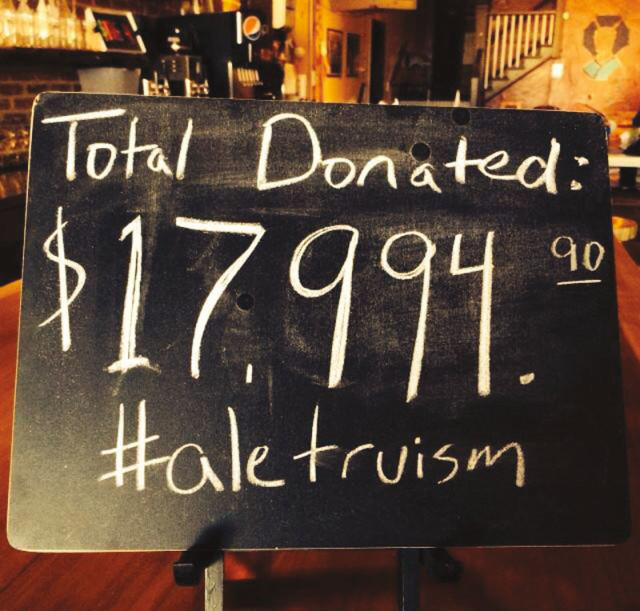
Image: Courtesy Oregon Public House
Because you can drink beer and support charity at the same time!
Woodlawn’s aptly named Oregon Public House claims to be the world’s only nonprofit pub. Here’s how it works: when a customer orders a beer, she or he “votes” for one charity from a list. At the end of the month, the pub tallies its profits, tallies the votes, and divvies up the money accordingly. If 20 percent of customers voted for the Neo Fund, for instance, 20 percent of profits go to microloans for Nicaraguans. Altruism and genius.
Because Seattle envies us.
The February 2014 issue of our sister publication, Seattle Met, put us in the spotlight with “Perfect Portland Getaways,” effectively reversing a favorite Portlandia skit in which, to the dismay of Portland’s mayor (played by Kyle MacLachlan), Seattle is featured on the cover of Portland Monthly as the “Gem of the Northwest.” We have arrived! (Note: Seattle has never appeared on the cover of Portland Monthly.)
Because 10 years ago, two Reedies ignited a distilling renaissance.
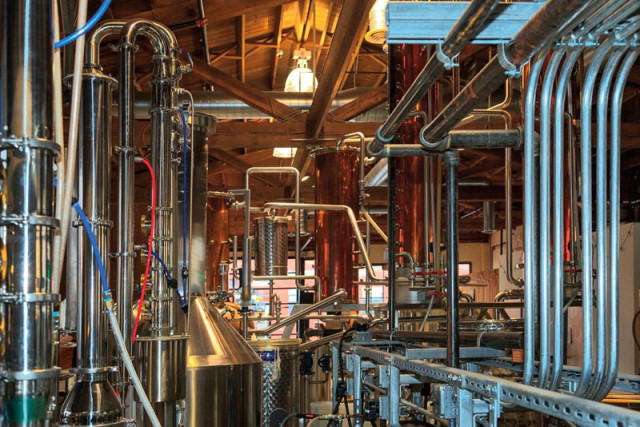
Image: Courtesy New Deal Distillery
When Tom Burkleaux and Matthew VanWinkle unveiled New Deal vodka in 2004, it propelled craft brew–loving Portland in a spirited new direction. The modest debut eventually sparked Southeast Portland’s Distillery Row and the nation’s first state distillers guild. “It just hit me: everybody is making good food and wine and coffee—let’s go make good spirits,” remembers Burkleaux. “I wouldn’t have thought of it if I wasn’t living in Portland.” Next up for New Deal, which now produces 12 distinct lines of spirits? Growing a field of flowers for the city’s first rose liqueur.
Because the Burnside Skatepark is the best example of anarchist architecture, anywhere.
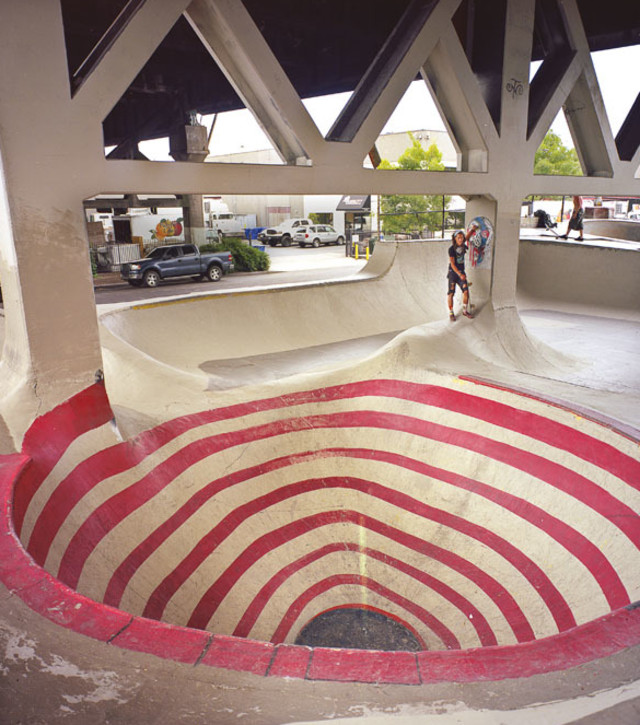
Image: Courtesy William Anthony
Legend has it that sometime in 1990, a few skateboarders hauled bags of cement to a scrap of unclaimed ground beneath the Burnside Bridge. They built a couple of ramps and started skating. Word spread. More wildcat construction followed—as did successful negotiations with surrounding property owners and even city council.
Today, the Burnside Skatepark is a global icon of skate culture, featured in movies and video games, sustained by volunteer labor and what one regular describes as “a weird lack-of-hierarchy hierarchy.” Its rounded and ever-evolving bowls and walls have a strange, organic beauty: the poetry of concrete, applied with love.
Because Willy Vlautin has already completed his bucket list.
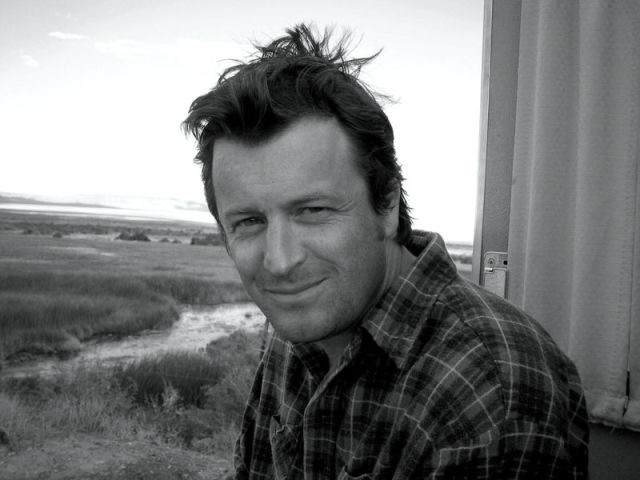
Image: Courtesy Decor Records
The 47-year-old author and Richmond Fontaine bandleader has had a remarkable year—in fact, he’s had a remarkable life.)
√ Start an alt-country band. Release at least 10 albums. Be big in Europe.
√ Write a novel. Get compared to Raymond Carver and Charles Bukowski.
√ Have said debut novel adapted into a movie starring acting legend Kris Kristofferson. (The Motel Life was released last November.)
√ Write fourth book: Iraq war vet goes into Blade Runner–esque coma-dream. (The Free came out in February.)
√ Start new band with a lady singer. Release album. (The Delines, fronted by Austin’s Amy Boone, release their first album, Colfax, on June 17, and will play a record release show at Mississippi Studio on June 25.)
Because while others seek to escape the city, we find joy in burrowing further in.
Down an old road frocked with blackberries—and a No Trespassing sign—lies this little nook of land carved from the river. At one time a lumber mill—and a dry dock for the city—this lost place now bears only wilting madrones and remnants of concrete, spouting tails of black rebar. Trails wind through the grasses.
You can say it is poisoned, and it is, a legacy of our history. But it is also a place of wild beauty, where native grasses poke industriously through the concrete slabs, and teenagers have splashed paint among the ruins. There are rabbits galore, and ground squirrels, and sometimes a bald eagle comes to soar overhead. A band of homeless people live in mired boats in the river.
This place reminds me of how Portland was when I was a child: a working-class town, perhaps a little seedy, but also a place where beauty existed among the raw, and anyone down on their luck could find a home. When I am here I feel at peace. When no one is around I spread my arms wide, like a child, and run in the grasses.
Rene Denfeld is a writer and private investigator. Her novel, The Enchanted, appeared in March.
Because nudity isn’t just for sex.
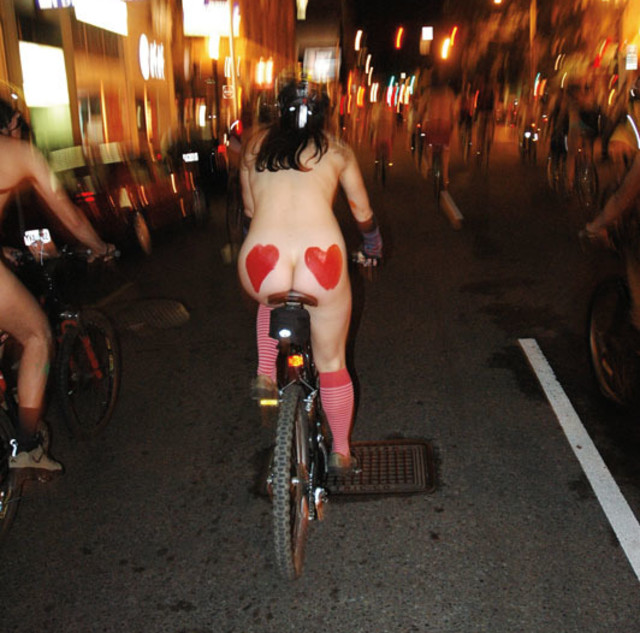
Image: Courtesy Jonathan Maus
In 2004, a ragtag crew organized a naked bike ride as part of Pedalpalooza. More than 125 people showed up. In the summer of 2013, Portland’s World Naked Bike Ride attracted 8,150 scantily clad cyclists. Wherefore the nudity? Consult the manifesto: “We face automobile traffic with our naked bodies as the best way of defending our dignity and exposing the vulnerability faced by cyclists and pedestrians as well as the negative consequences we all face due to dependence on oil, and other forms of non-renewable energy.” This year, Portland rides on June 7—best start getting in pedaling shape now!
Because you can see FOUR massive volcanoes from downtown Portland...
Each of which could conceivably erupt at any second.
So, theoretically, we Portlanders cheat death just by waking up.
Because our urban growth boundary actually works.
12%: Expansion of the area within Portland metro’s urban growth boundary over 25 years
60%: Metro population growth over that same time
375,000: Acres devoted to farm production in counties touched by the UGB, 1978
570,000: Acres devoted to farm production in counties touched by the UGB, today
Because one man hand-builds sculpturally beautiful microphones in his own 1930s speakeasy.
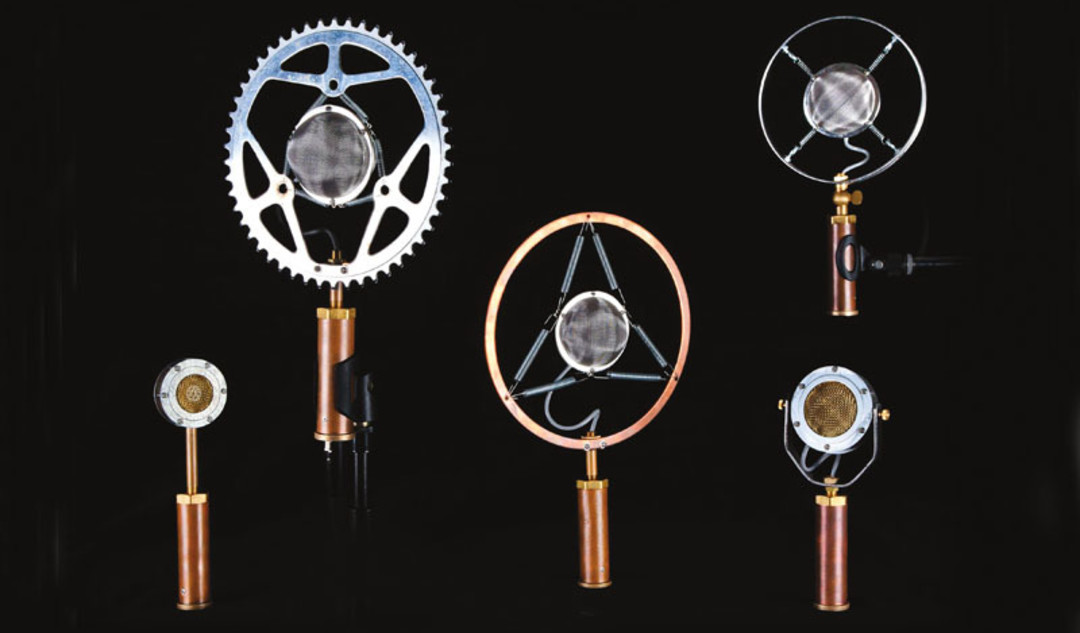
Image: Courtesy Ear Trumpet Labs
Philip Graham, founder of Ear Trumpet Labs, runs one of Portland’s most intriguing basement workshops, where he makes striking retro microphones (as seen here) designed to produce high-quality live sound. Bonus: he handles shipping out of a room that operated as a Prohibition retreat for thirsty Northeast Portlanders, complete with shady side door, bar, and rusty sink.
Because Portlanders are prone to setting odd world records.
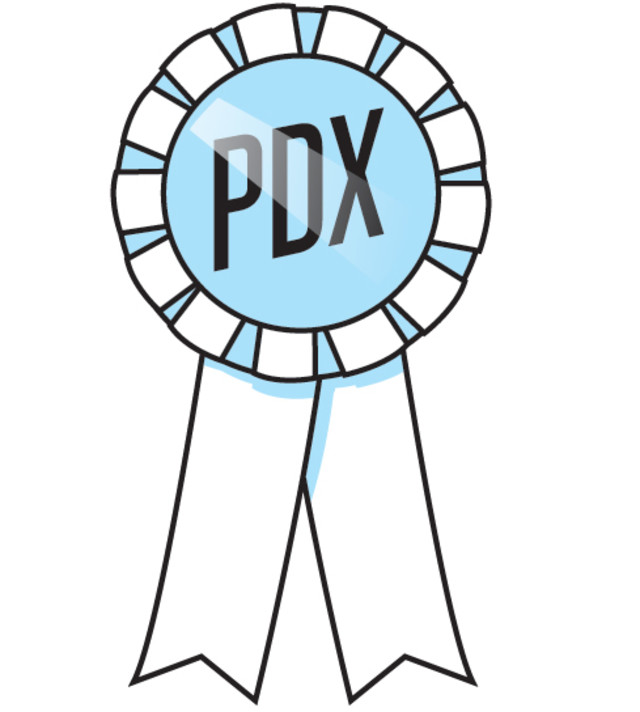
Largest gathering of redheads: Last August, more than 1,300 gingers congregated in Pioneer Courthouse Square. Biggest tree hug: Up in Hoyt Arboretum, 951 people gave minute-long hugs to trees. Burpees: That nausea-inducing push-up/plank/jump extreme exercise? A Portlander did 9,480 over three days. High-speed grocery bagging: Executives from a local scanning technology company clocked 50 items in 51.91 seconds. Most successful three-point basketball shots in one minute: Twenty-five, to be precise. In your face, world!
Because we don’t just read, write, and listen—we publish.

Here’s just a handful of the great indie presses in Portland:
- TIN HOUSE Our highest-profile indie press.
- MICROCOSM Many of the –isms—anarchism, veganism, activism—with wild cards like health and religion.
- OOLIGAN Portland State’s publishing program builds books from start to finish.
- HAWTHORNE A literary house with strong regional roots, national reach, and a sharp design sensibility.
- GLIMMER TRAIN Twenty-plus years of dedication to the short story.
- FOREST AVENUE “Quiet novels” that counter tradition: the world changes the hero.
- LAZY FASCIST Specializing in the unquantifiable: adult fairy tales, hybrid plays, zombie sharks. And great covers.
- DEADITE “The very best in cult horror”: like Silence of the Lambs met Amityville Horror and conceived a literary baby.
Because we’re home to the tech world’s most reclusive superstar.
Linus Torvalds could be Portland’s Bill Gates, but he gives his product away. The Helsinki-born programmer pioneered the Linux operating system in 1991, and began allowing other programmers to use, change, and add to it—free. Long the choice of hard-core nerds, over the past few years Linux has become the world’s fastest-growing desktop operating system. It runs more than 95 percent of supercomputers, and forms the backbone for many tablets, phones, and game consoles. Torvalds has a house in Beaverton and an utterly nondescript public persona. He’s the Most Interesting Least Interesting Man in the World. Perfect.
Because Portlandia came with a poem that not enough people know.
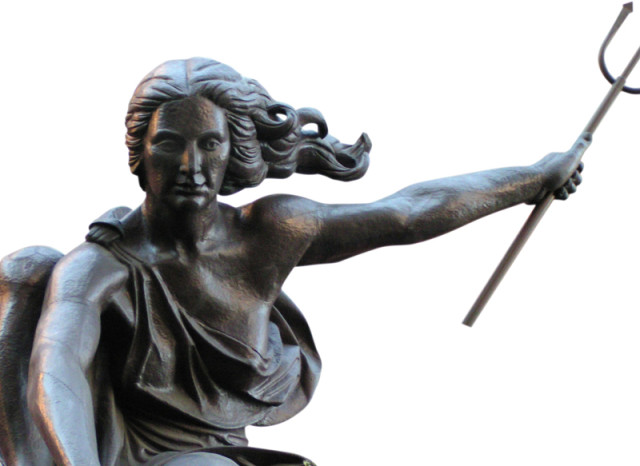
She kneels down
and from the quietness
of copper
reaches out.
We take that stillness
into ourselves
and somewhere
deep in the earth
our breath
becomes her city.
If she could speak
this is what
she would say:
Follow that breath.
Home is the journey we make.
This is how the world
knows where we are.
—Ronald Talney
Because we have food carts.
... food-cart pods.
... late-night food-cart pods.
... late-night food-cart pods for drunk people.
... late-night food-cart pods for drunk vegans!

Potato Champion's vegan poutine, anyone?
Image: Lauren Lark
Because our very own sausage king was once a meat-free pro snowboarder.
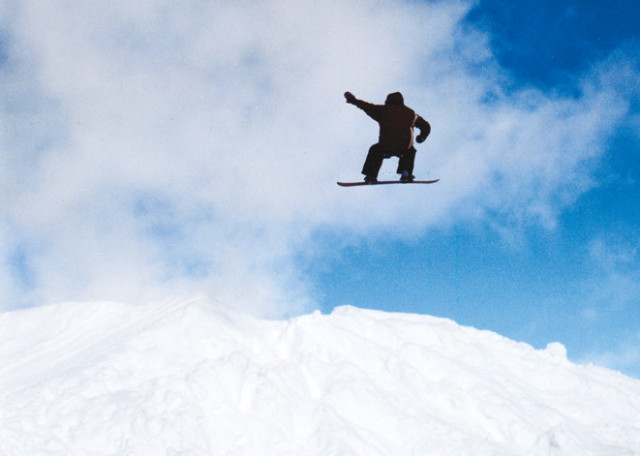
Image: Courtesy Elias Cairo
“All my friends were vegan punk rockers,” says Elias Cairo of the days before he started curing 8,000 pounds of meat a day at Olympic Provisions’ 33,000-square-foot factory. In the mid-’90s, Cairo dropped out of high school to pursue a sponsorship from outdoor gear titan Burton and do backflips for national magazines.
By age 18, the adrenaline wore off. “I remember the tipping point,” says Cairo. “I was boarding with some of my snowboard idols—the greatest in the world—and they kept hurling themselves off this huge ledge. There was zero visibility. All I could hear from below was: ‘Go faster! You won’t clear the jump!’ All of the big-time guys were crashing on the rocky cliffs below. I made it ... barely. The next year I moved to Switzerland and learned how to make salami.”
Because TV shows pretend to be in PDX now.
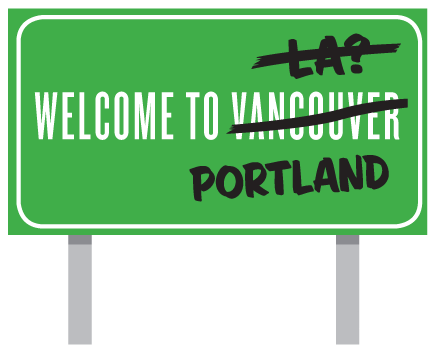
This fall’s Fox show Backstrom adapts an irritable detective (The Office star Rainn Wilson) from Scandinavian source novels to solve crimes for the Portland Police Bureau. Hidden twist? Backstrom actually shoots in Vancouver, B.C. Creator Hart Hanson: “The preoccupations of Portland—art, style, coffee, education, environment—are all good for Backstrom. I have the distinction of having three cities annoyed with me: Portland, because we’re shooting in Vancouver. LA, because they are losing production to other cities. And Vancouver, because they’d love to play themselves in a series for once.”
Because maybe—just maybe—beer counts as health food.
Upstream Public Health will celebrate its 10th anniversary in June by challenging local breweries like Ecliptic, Widmer, and Upright to concoct their healthiest possible brew. Can a beer infused with nutrient-rich ingredients, antioxidants, and beneficial herbs be tasty? A panel of local celebrity judges will decide.
Because our coffee shops are more than just coffee shops.

Image: Lauren Lark
Coffee + interior design: Designer Chris Giovarelli curates the Pearl District’s stunning CDExD, where florist Cosmin Bisorca arranges fresh blossoms and Kevin Nichols, formerly of Water Avenue Coffee, presides over the gleaming espresso bar.
Coffee + wine: Enso Winery joined forces with Water Avenue Coffee to make its SE Stark Street tasting room a daytime coffee bar.
Coffee + laundry: North Portland’s Spin Laundry Lounge ingeniously combines clean clothes with Fog Valley Coffee.
Coffee + nonprofit: Volunteers founded TaborSpace in a disused bell tower at Mt Tabor Presbyterian Church—it’s now a nonprofit café and grassroots community center.
Coffee + bar: A beautiful little Euro-accented bolthole on NW 21st Avenue is Sterling Coffee Roasters by day, convivial M Bar by night.
Coffee + lighting: Ristretto Roasters’ third location, in Schoolhouse Electric, is incandescent in metaphor and fact.
Because green building isn’t just for the rich.
For more than 30 years, Reach Community Development and William Wilson have created buildings that only the most experienced eye might identify as affordable housing. The Orchards, a new project at booming Orenco Station slated for completion next year, should be the largest multifamily Passive House project in the nation. (The technique, pioneered in Europe, uses insulation and tight seals to create super-efficient buildings.) The complex will serve renters making less than $30,000 a year.
Because our city is living science fiction.
Portland, a town that defines itself as forward-looking, makes a good match for science fiction, genre of the future, and sci-fi writers have produced some notable visions of the Rose City.
In Octavia Butler’s 1993 novel Parable of the Sower, as LA dissolves into armed cul-de-sacs, water is a luxury, dirty is the new chic, and people dream of green Oregon—anticipating a future in which we may have to defend the Columbia River and cope with climate refugees. But suppose that, instead, Tea Party activists take over Oregon and abolish the urban growth boundary. Jay Lake described the possible result in his 2009 story “In the Forests of the Night.” Cascadiopolis is a non-city woven through the forests and mountains, a network of low-impact enclaves that look like forest compounds but together amount to an ecologically sensitive alternative to Portlandopolis. And of course there’s Ursula K. Le Guin, who projected a Portland of 2002 in 1971’s The Lathe of Heaven. George Orr can literally dream different versions of Portland and the larger world into existence.
Then there is more metaphorical food for thought. In his 1956 classic City and the Stars, Arthur C. Clarke described a city so full of interesting things that nobody feels the slightest urge to venture outside—for millions of years. Could that forecast how self-satisfied Portlanders, ensconced in super-cool neighborhoods, think—or don’t—about the boring world beyond the range of an easy bicycle commute?
Carl Abbott is a professor of urban studies at Portland State University. His book How Cities Won the West: Four Centuries of Urban Change in Western North America appeared in 2008.
Because we’ve got more than one life to live.

GEORGETTE ECK: THE PEARL ROOM GALLERY AT POWELL’S // THE WORLD’S BEST KARAOKE SCENE
Image: Ashley Anderson
| Name | By Day | Moonlights As | Secrecy Level | Hidden Connection |
|---|---|---|---|---|
| Georgette Eck | A social worker at Immigrant and Refugee Community Organization | “Indigo Hurls,” cocaptain of the notoriously ruthless Breakneck Betties team in the Rose City Rollers roller-derby league | “It’s hard to hide why you have a sprained ankle,” Eck explains. But with her clients, she keeps her skating under wraps: “It would be a surprise that their nice caseworker puts on roller skates and knocks people to the ground after work.” | Roller derby serves as a refuge from refugee work—and that makes Eck a better social worker, she says. “We spend so much time giving to other people that we don’t fill our cup back up. I have a place where I can work that energy off.” |
| Rex Ritter | Vice president and adviser at Umpqua Private Bank | Guitarist for local jazz-fusion combo Fontanelle; member of noted drone-metal collective Sunn O))) (known for wearing black hooded robes during performances) | Depends on your clearance. “The details are tailored to the audience,” Ritter says. “Most folks appreciate that I’m not just a boring banker.” | Ritter caught flak for his day job while on tour with Sunn O)))—till he whipped up a spreadsheet projecting the total tour income. |
| Dana Haynes & Katy King | Haynes is Mayor Charlie Hales’s communications director; King, his partner, runs her own government relations firm. | Published mystery writers—both of them. King is the author of the lady-detective mystery City of Suspects, while Haynes has written four Clancyesque novels of international intrigue. “We’ll sit in coffee shops,” says King, “fingers poised over our keyboards while we have deep conversations about staging plots of mass destruction in fiction-land.” | Haynes’s double life is on the down-low. “I don’t talk much about it at work,” he says. “I’m not the story; the mayor, or the city, or the policy is the story.” When her book came out, King was less clandestine—she even wrote some colleagues into future books at their request: “I made a particularly nice set of brothers into drug lords.” | Characterization. Just like he’s had to “hear” his characters’ voices to write convincingly and distinctly as them, Haynes needs to “hear” the mayor’s voice to serve as his spokesman. |
| Robb Wolfson | Citizen-involvement coordinator for Multnomah County | A competitive eater. Since entering his first eating contest six years ago on a dare, Wolfson’s won about two-thirds of his approximately 20 competitions. | Wolfson finds his hobby only helps at work. “One of the best ways to engage people is to make them laugh,” he points out, “and it’s an almost guaranteed laugh if you tell people you do competitive eating.” | Thick skin. Getting yelled at by angry citizens and getting laughed at with your face planted in sauerkraut aren’t, after all, so different. |
| Aaron Woo | Chef-owner of vegetarian eatery Natural Selection (and owner of its casual neighbor, Vita Café) | A managing partner of indoor-soccer complex Rose City Futsal, where he oversees the on-site pub | When you own two restaurants, co-own a sports facility (and play there), and are raising two kids in Northeast Portland, covert operations are near impossible. | Futsal—a fast-paced, passing-heavy soccer variant—is marked by the same teamwork and all-consuming intensity as cooking on the line, Woo observes. “That’s the thing I feed off of: living in the moment.” |
Because our roses date back to the Middle Ages.
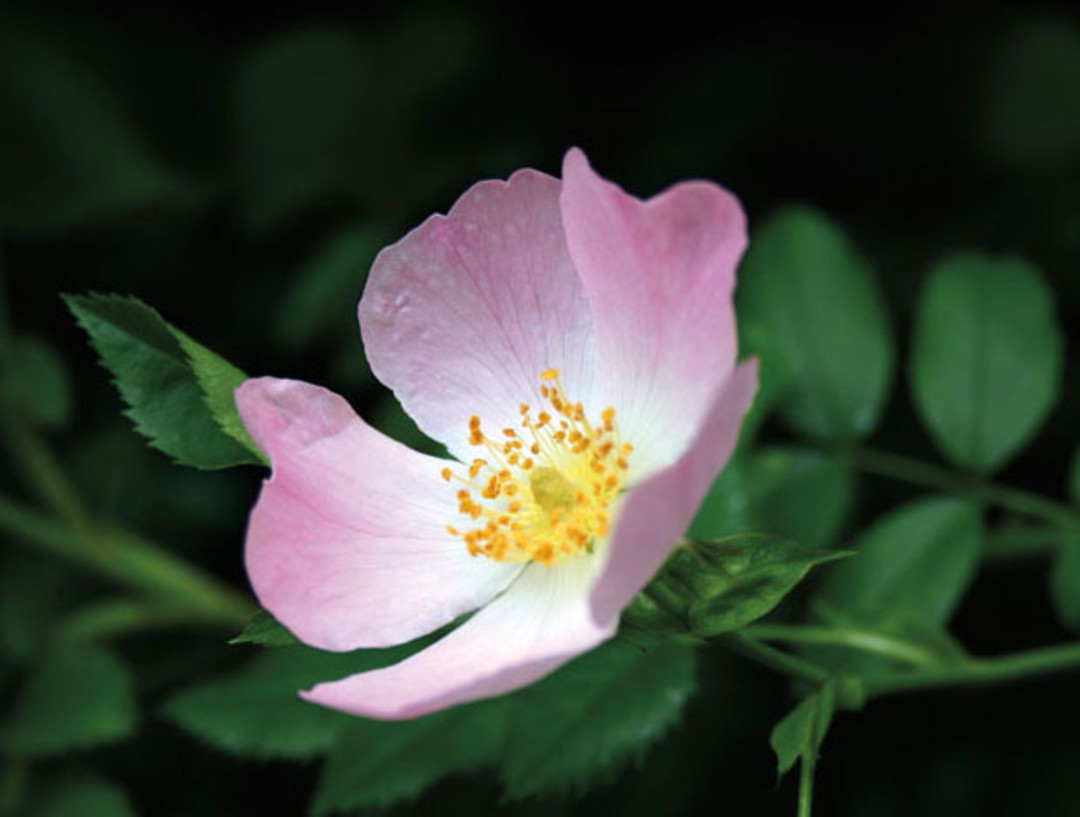
Image: Courtesy John Bancroft
Portland’s famed International Rose Test Garden cultivates 10,000 varieties, from the Betty Boop and the George Burns (yes, really) to the Moondance and the Golden Showers (yes, really). Among them blooms the world’s oldest known rose, soon to celebrate its 1,200th birthday: a “dog rose” known as Rosa canina (pictured), cut from a giant rose bush at a cathedral in Hildesheim, Germany. No one seems to know exactly how we got a piece of that huge mothership, planted in 815. (Some think it was a gift to Mayor Vera Katz.) But we do know that the mysterious German rose is in good company. Portland’s test garden was founded in 1917 to provide a home for European hybrids that rose aficionados worried would be destroyed in World War I. The original Hildesheim Rose burned during Allied Forces’ 1945 bombing. Eight weeks later, it sprouted 25 new shoots.
Because our evangelicals believe in evolution.
“Christianity can be what the Bible says it is, and evolution can be what the evidence says it is, without any horrible conflict,” says 26-year-old Newberg journalist Tyler Francke. Francke’s blog godofevolution.com has gotten him called a heretic. But it also attracts thousands of readers per month. “Multimillion-dollar organizations claim Christians must reject a few, select scientific principles,” he says. “I’m just offering a modest alternative.” And Francke’s not finished: his first novel, out this month, may be the first for an evangelical audience to feature a gay protagonist.
By 2015, Oregon weddings will be all the more amazing.

With a recent poll showing 61 percent of Republicans and 77 percent of Democrats under 30 in favor of same-sex marriage, it’s pretty clear that fighting gay marriage is a losing position. And as political leaders across the party lines of our great state show overwhelming support for the November 2014 ballot measure filed by Basic Rights Oregon (good on ya, Dorchester Conference!), it appears that marriage equality is inevitable. (In an after-party-related side note, legal cannabis may be on its way, too.) We hear lots of wedding bells in Oregon’s future...
Because this is the ultimate kids’ city.
Cosmic Monkey Comics and hot chocolate. MarchFourth Marching Band. Miyazaki film festival at the Northwest Film Center. The zoo. “Kindie rock.” The “grilled cheese bus.” Oaks Park six-dollar preschooler days. A zombie musical for kids. Trapeze class. Picking berries on Sauvie. The libraries.
I thought I loved Portland before my daughter was born. It seems to me now that was just a crush. This is what it feels like to love a city: to know that I can count on it to light Clementine’s mind on fire every day in some new way, to keep her vigorous and fascinated—and muddy. To keep me happy, along with my husband and countless other parents, as we figure out how to grow our small people into interesting big people.
Thirteen years ago Jim and I moved here straight out of art school and hunkered down to write and draw. Portland has been the perfect bubble in which to nurture our own creative lives and careers, and now it has taken on this tremendous new dimension as a kid’s city: playground, wilderness, book paradise, riverscape, art-land, and center of quirk. It’s a beautiful, inexhaustible puddle to stomp in.
Laini Taylor is the author of the Daughter of Smoke and Bone trilogy; the final installment of the series, Dreams of Gods & Monsters, appeared this spring.
Because here, drinking = thinking.
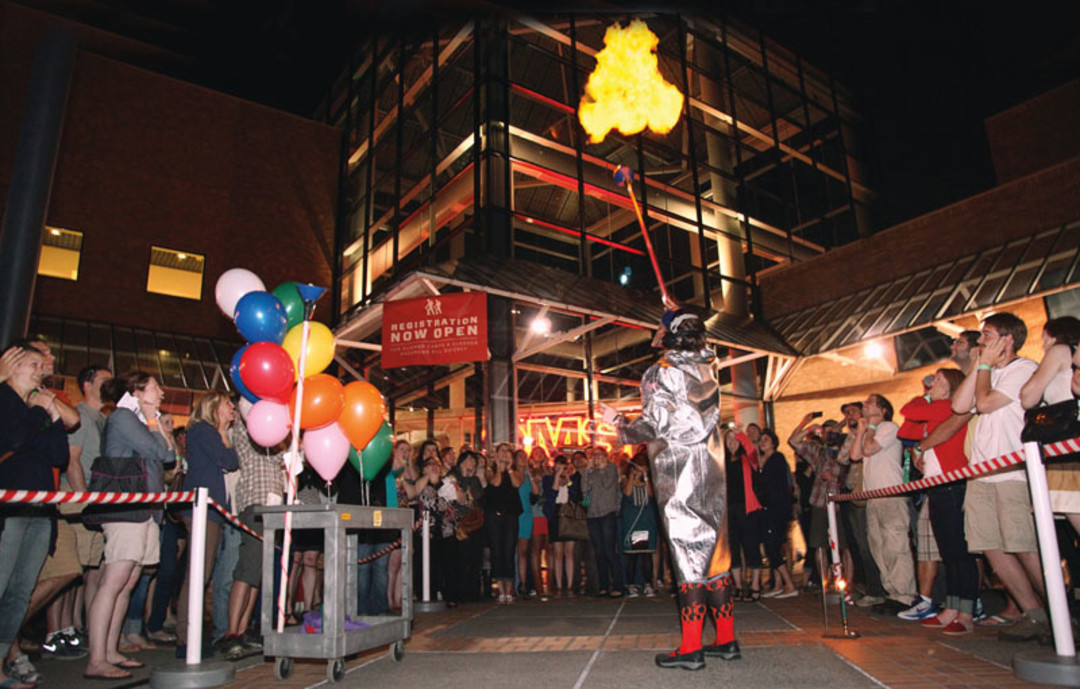
Image: Courtesy OMSI
- OMSI AFTER DARK (above): Grown-up geeks mob the museum for a night of boozy science and kid-free fun.
- HISTORY PUB MONDAY: Local experts lead lively humanities lessons between pints of McMenamins ale.
- PAINT AND PROST WORKSHOP: Art School Studio students sip Northwest beer and wine and hone their craft.
- SCIENCE PUB PORTLAND: Beer halls put the PhD in pub with talks on robotics, geology, and oceanography.
- THINK AND DRINK: Oregon Humanities hosts this happy-hour conversation series, combining deep discussions with deeply discounted drinks.
Because you can get there from here.
Fourteen American airports fly nonstop to both Europe and Asia year-round. Portland International is the smallest. Delta’s routes to Amsterdam’s Schiphol and Tokyo Narita pump an estimated $215 million into the region’s businesses. Beyond money, the flights put us on the world map: Schiphol connects Portland to Africa; Narita opens up China and Southeast Asia.
Because small is the new big.
We’re a haven for VIPs looking to trade in Big-City success for a unique brand of careerism. A sampling of Stumptowners who braved the 21st-century Oregon Trail:
- Steve Gaynor, former game designer at California’s major AAA gaming company 2K Marin, returned to Portland to launch indie game studio the Fullbright Company—and its critically acclaimed debut game, Gone Home.
- Rick Gencarelli left a culinary career in New York City and Burlington, Vermont, to open a food cart called Lardo, which has become a local sandwich empire with three brick-and-mortar locations.
- Rodney Hicks, who made his Broadway debut as a part of the original cast of Rent, came to town for Portland Center Stage’s Oklahoma! and never left. He returns to PCS’s stage this spring to play the lead role in Othello.
- Scone whisperer Kim Boyce, former pastry chef at Wolfgang Puck’s Spago in Beverly Hills, relocated to open shoebox-size Bakeshop on NE Sandy Boulevard.
- Carrie Welch, once vice president of public relations at the Food Network, traded meetings with Bobby Flay and Rachael Ray to wait tables at Wildwood, launch local PR company Little Green Pickle, and co-found Feast Portland.
Because sometimes, you can’t even pick a reason.
How easy and fun it would be to write about oceans of clean water falling profligately from the sky, in a world where clean water and wars over it will be the story of this century; or to write about shaking hands with Ken Kesey and Barry Lopez and Ursula K. Le Guin in the streets of this city, the three greatest writers we ever had; but why don’t I say something real and blunt instead?
I love the shaggy moist grace of people here. I love the insistence on creativity. I love the general lack of class-snottiness and status-brandishing. I love that money matters but it doesn’t rule the roost. I love that mostly people are friendly except about parking. I love that spiritual search beats religious arrogance here. I love that a mayor once exposed his personal sculpture to a statue.
I hate that we need an active, energetic food bank, and I love that it collected 44 million pounds of food to share last year. I love that when the sun finally comes out in July people emerge from their caves moaning and steaming and singing songs of awe. I love that who your parents were is not as important here as who you are. I love that a river runs through us and I hate that it’s a foul sewer.
I love that we don’t care much about what outsiders think of us because finally we grew up enough to care only about being a better us. I love that the city bird looks like a grim blue skinny dinosaur with wings and a bad toupee.
Brian Doyle edits the University of Portland’s magazine. His novel The Plover appeared in April.
...And all the other stuff that makes us Portland:

North American Organic Brewers Festival // Hidden staircases in Goose Hollow // The Springwater Corridor Sellwood’s Stars Antique Mall // Sunday Parkways // Pier Park disc golf course // Portland Winterhawks // Cherry blossom season // Forest Park’s Wildwood Trail // The St. Johns Bridge // Alley 33 fashion show //Summer berries! Winter mushrooms // Microbrews in movie theaters // The Timbers Army // Hiking to Pittock Mansion // The Hillsdale farmers market // Pendleton blankets // Open skate at Oaks Park // The Writer’s Room at Multnomah County Library // Sunset MAX commutes over the Steel Bridge // Ground Kontrol Classic Arcade // Snow at the Japanese Gardens // OBT Exposed // Old-growth trees within city limits // Oregon Zoo train... Did we miss your favorite thing about Portland? Tell us in the comments below!
